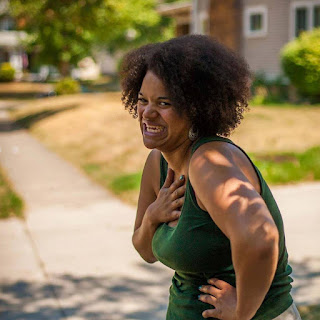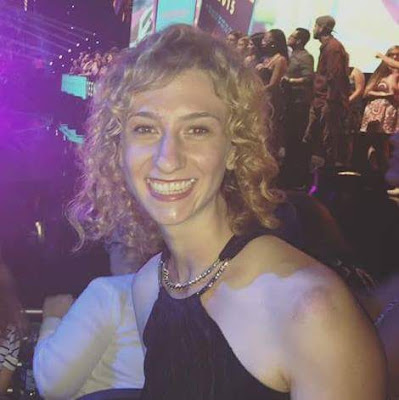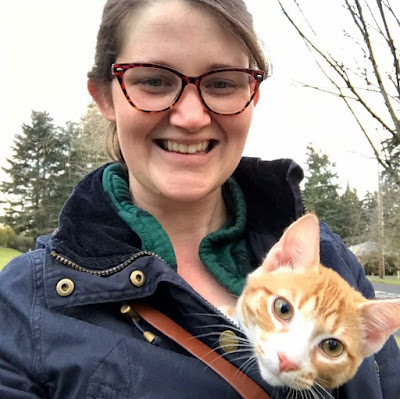During the months of June and July we will be featuring our soon-to-be alumni as they look back on their time at Hamline University. Today's featured grad is: Dori F. Graham. (The F is for Fancy.) Dori lives in Fort Wayne, Indiana. Find Dori on social media at @Doremedusa.
What do you do when you’re not working on packets?
 For my grown-upping, I landed my dream job as a Children’s Librarian for the Allen County Public Library in Fort Wayne, IN where my days include things like storytimes, crafts, book hunts, and bubbles. And, it’s heavenly. I’ve been with ACPL for four years this July, and I still can’t believe I get paid to be there!
For my grown-upping, I landed my dream job as a Children’s Librarian for the Allen County Public Library in Fort Wayne, IN where my days include things like storytimes, crafts, book hunts, and bubbles. And, it’s heavenly. I’ve been with ACPL for four years this July, and I still can’t believe I get paid to be there! When I’m not at work, I love to listen to audiobooks. I listen while I bake, or do the dishes, or play Soda Crush (I’m currently on level 941). Also, I really like to do nothing. And by do nothing, I mean stare at my fish tank, a lava lamp, a candle... I regularly stare at boring things—a bit like an infant who can’t stop looking at the ceiling. (Some people would call this mindfulness, but I know their tricks—it’s really just fancy boredom. But, whatever you want to call it, it’s pretty much The Best.)
How did you hear about the Hamline MFAC Program?
A few years ago, the AWP conference took place in Minneapolis. I tagged along with my fiancée who is a poet and a professor. One night, I was looking through a huge booklet full of MFA programs that I’d gotten at the bookfair, and when I saw that Hamline’s MFA specialized in writing for children, I said to my fiancée, “Someday, I want to look into going there.” She said, “Why not today?” I Bha-ha-ha-ha’ed in her face…then realized she was serious…then further realized she was serious because she had faith in me—far more faith than I had in myself. After a bit of mental pep-talk, I giggle-cried a little bit, and said “Hokay!”
The next morning, we went to the booth and I chatted with Mary Rockcastle. Within minutes, it became clear that this was the program that could help me move towards my wilder dreams.
What was your writing experience prior to entering the program?
Prior to the program, I would have said I was a writer with a lowercase “w.” I thought about writing FAR more than I actually wrote. Now, I write far more than I ever thought I would, and while the “w” isn’t quite uppercase, it’s getting there.
What do especially remember about your first residency?
At my first residency, I remember feeling TOTALLY out of my element, but SO pleased to be there. I kept thinking, “They got it wrong! I never should have made it into this program with all of these brilliant, talented people,” but I also thought, “They speak my language and I never want to leave!”
Have you focused on any one form (PB, novel, nonfiction; graphic novel) or age group in your writing? Tried a form you never thought you’d try?
I tried to gain as much experience as possible while I had the chance to be mentored, so I worked on picture books with ever-genuine, tenderhearted Phyllis Root, I worked on a young adult novel with the sharp-as-a-mother-freaking-tack Swati Avasti, I did some middle grade chapter book writing with Emily “Up Your Game” Jenkins, and I finished my Hamline career by reworking my YA novel with the one and only, ever-giving Marsha Chall. My one regret? Never trying a graphic novel script. Someday…
Tell us about your Creative Thesis.
My creative thesis is a young adult novel called Just Jada (Not Jugs) about a fifteen-year-old girl named Jada. Jada is a quirky, bosomy sophomore at Bridgemont High School where she’s continually teased for having large boozies and being a little “weird.’ While her best friend, Gwen, is out of the country for more than a year, Jada makes friends with the new guy, a gorgeous basketball player named Shawn. Their connection improves Jada’s social standing, but when things with Shawn become “more than friends,” Jada is torn between leaning into the new relationship or following her heart…which just might be trying to lead her back to Gwen. The story is a gentle, quirky tale about friendship, first (and second) love, social bravery, sexual fluidity, and tea—they drink a lot of tea.
What changes have you seen in your writing during your studies?
The biggest change that I’ve seen is in my ability to pace exposition and action. During my second semester, Swati Avasti asked me to write an essay on scene versus exposition using the short story Blood Child by Octavia Butler as my primary source material. If there was ever an argument against writing critical essays, this moment in my studies definitely defends the need for them. Through breaking down Butler’s short story, I really began to understand when to be “in scene” and when to give exposition/commentary/background. Swati is responsible for what I call “The Great Shift” in my writing ability.
Any thoughts for entering students or for people considering the program?
My favorite quote (by Kate Forsyth) says, “May my heart by kind, my mind fierce, and my spirit brave.” You will need all of these qualities to write for children, and you can grow all of these qualities and more at Hamline. Whatever the naysayer in your head might try to say to distract you, tell it “Nevertheless” and get thee to Hamline!







